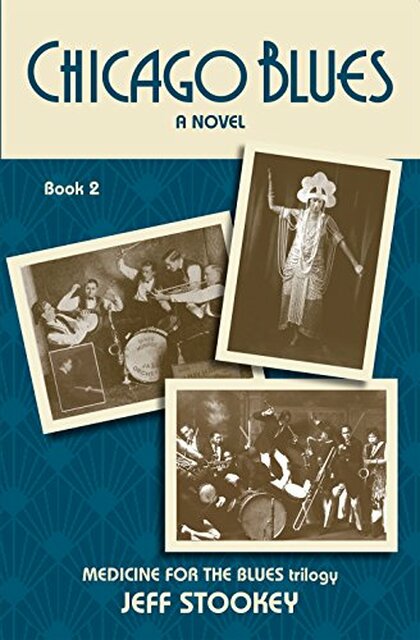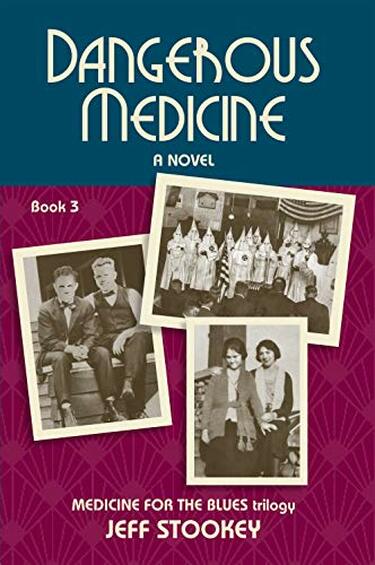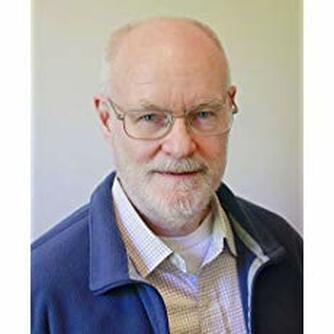|
book reviews |
|
Multi-volume author, Jeff Stookey, introduces us to the second volume in his “Medicine for the Blues” series, “Chicago Blues”: Jimmy Harper arrives in Chicago with the Diggs Monroe Jazz Orchestra, seeking fame and fortune. Instead, he descends into the jazz underworld where he becomes entangled in dark dealings with a sinister mob boss and in an erotic affair with a black drag performer. In this unfamiliar world, Jimmy begins to question whether he can trust anyone, even his old band members. "… a finely woven tale of self-discovery and acceptance." —Poison Waters/Kevin Cook, Drag Queen Extraordinaire. The trilogy Medicine for the Blues, a work of historical gay fiction, explores the complexities of gender and sexuality through the lens of the early 1920s. Chicago Blues follows Book 1 Acquaintance. The story continues in Book 3 Dangerous Medicine. I really enjoy the style and quality of writing that comes from the heart and pen of Jeff Stookey. He has an amazing eye for so many details in this historical fiction, I feel like I am right there. His scene-setting is marvelous, dialog and action are impeccable. Everything seems so real. I give this book 5 stars! It’s so good. You can buy this book: https://www.amazon.com/Chicago-Blues-Medicine-Book-ebook https://www.goodreads.com/-chicago-blues https://www.amazon.co.uk/Chicago-Blues-Medicine-Book Tags: LGBTQ, gay, jazz, music, singing, drugs, mobsters, Chicago * * * Multi-volume author Jeff Stookey introduces us to the third volume, in his series “Medicine for the Blues, “Dangerous Medicine”: In a time when homosexuals had to hide their identity, Dr. Carl Holman’s status with the respected clinic where he works is imperiled by pressures from the Ku Klux Klan, societal expectations to marry, and other forces beyond his control. As compassion impels him to treat unorthodox cases involving addiction, birth control, and child abuse, he must make difficult decisions about his professional and domestic affairs. Can Carl and those he loves find a way to live authentic lives in a hostile world? I really enjoy Jeff’s writing, his first person POV is tops, bar none. The reading is so smooth, you are transported to the time and place in the book without any effort on your part. Splendid scene-setting, accompanied by awesome action and dynamic dialogue, will leave you breathless at the end of the book and the series. The finale of “Medicine for the Blues” series, “Dangerous Medicine” gets the top score of 5 stars! You can buy this book: https://www.amazon.com/dangerous-medicine-jeff-stookey https://www.goodreads.com/-dangerous-medicine https://www.amazon.co.uk/Dangerous-Medicine-Blues-Jeff-Stookey You can follow Jeff Stookey:
https://twitter.com/jstookey108 https://jeffstookey.com/ http://medicinefortheblues.com/ https://www.facebook.com/Medicine-for-the-Blues-804068619770425 https://www.linkedin.com/in/jeff-stookey-2b5357141 https://www.flickr.com/photos/153028055@N04/albums https://www.instagram.com/jeffstookey1923 Tags: LGBT, gay, jazz, medicine, historical fiction, Oregon, My review of the first book in the series: www.wordrefiner.com/book-reviews/acquaintance-medicine-for-the-blues-book-1-by-jeff-stookey Copyright © Mark Schultz 2019 except for the author's introductions
23 Comments
2/2/2019 12:47:01 pm
I am smiling after reading this review, happy to know that you enjoyed my Medicine for the Blues trilogy. You mentioned the quality of the scene-setting, and I believe I can attribute that to my long infatuation with movies and filmmaking. I spent the first few decades of my life as a film buff and completed a number of short films. That visual orientation focuses my writing on small physical details and the space and movement within any scene. Historical accuracy was important to me in writing this story and I spent many hours studying postcards and photographs from the early 20th century. I hope your review will inspire others to learn more about this period, which has many parallels with our present historical moment.
Reply
Mark
2/2/2019 02:18:58 pm
My review covers quite well how much I enjoyed reading your books. It did get a little bit racy for me in a couple of places, I have no doubt many will enjoy your books, they are so well written.
Reply
2/3/2019 12:20:39 pm
Chicago Blues had to get a bit racy because Jimmy Harper needed to fully come to terms with his sexuality. I felt it would be dishonest to leave out the sex, like they do in the movies when the camera pans away once the kissing starts.
Reply
Mark
2/3/2019 02:05:25 pm
I agree, it was pretty important to the story about Jimmy. Going through the wringer, like he did, really clarifies what is important and what is not.
Reply
2/4/2019 04:00:59 pm
Historical research was very important to me in writing this story. Around the time I started, I heard a report about Umberto Eco when he was writing The Island of the Day Before. He began reading all the sea novels he could get his hands on and studying maps, paintings, and other images from the 1600s. Following his cue, I collected early gay themed novels, many listed in the Bibliography tab at the top of my website. (One of my favorites was Henry Blake Fuller’s Bertram Cope’s Year, 1919. Quite a fun read.) Collecting postcard images from the early 20th century provided another important resource. John Loughery’s book The Other Side of Silence came out the year I started writing this story and that book opened a whole world of gay historical research that was new to me. I also met two Portland historians early on, George Painter and Tom Cook, who directed me to numerous historical resources. Then during the years that I worked on this project an explosion of gay history came out in the press. Without gay historians like Peter Boag, Jonathan Ned Katz, and George Chauncey I never could have written what I did.
Mark
2/4/2019 04:19:10 pm
That is quite amazing, how all those resources appeared just when you needed them.
Reply
2/5/2019 01:39:43 pm
Amy Livingston designed the book covers for Medicine For The Blues trilogy. You can find her at
Reply
Mark
2/5/2019 02:18:35 pm
I do like the covers a lot. I have a background in photography, I particularly enjoy black and white photographs. Color pictures can hide a host of issues that are exposed when the picture is black and white.
Sophia Douglas
2/4/2019 07:20:58 pm
So glad to see you are getting good reviews, Jeff. I celebrate your accomplishments as writer and especially for working with such complex difficult issues of intersectionality. Do you have any connections at First Unitarian Church of Portland? Best regards, Sophia
Reply
2/4/2019 08:31:01 pm
Hi Sophia. Great to hear from you. Yes, I'm thrilled that the trilogy is getting a good reception. Glad you used the word intersectionality. Many different issues from the 1920s have resurfaced across cultural lines in our politics today. Yes, I know a few folks from the Unitarian Church here in Portland. They are very progressive regarding social justice. Be well.
Reply
Mark
2/4/2019 11:11:57 pm
Thank you for dropping in Sophia. Jeff has written an amazing book.
Reply
2/6/2019 02:58:23 pm
Mark:
Reply
Mark
2/6/2019 03:28:45 pm
Distribution is a huge issue, of course. I am glad your books are available locally as well as on Amazon.
Reply
2/7/2019 02:35:06 pm
New questions:
I love the old photos on your covers. Tell me more about them.
Mark
2/7/2019 02:51:37 pm
So old photographs have become an item, just like old postcards are quite the industry now. I am not surprised. I bet Ken's collection is quite large, I appreciate him sharing that with everyone on your website.
Reply
2/8/2019 02:11:07 pm
You can view the collection of past “Featured Image” vintage photos on my Flickr account: https://www.flickr.com/photos/153028055@N04/albums/72157682524026873
Reply
Mark
2/8/2019 02:34:33 pm
Thank you for the invitation to your Flickr account. That will be interesting. 2/9/2019 12:39:46 pm
I’ve been told my dialogue is good, but I can’t say it is easy to write. You kind of have to just let the characters speak. Action is difficult for me. It seems to me it has to be quick and smooth and accurate, but I tend to want to over-describe the action.
Reply
Mark
2/9/2019 08:30:30 pm
I think your dialogue is top notch. It feels very congruent to the era you wrote the stories in.
Reply
2/10/2019 01:02:38 pm
I couldn’t give you a number as to how many drafts I went through before publishing. Many, even before going through it with my editor.
Reply
Mark
2/10/2019 06:15:04 pm
Thank you, Jeff, for sharing your thoughts about your writing and publishing experiences. I have enjoyed our conversation.
Reply
2/11/2019 09:27:01 pm
You're welcome. I appreciate this forum for spreading the word about my writing. Your questions have have pushed me to re-exlore some of my past and present. 9/21/2021 08:25:15 pm
Can you correct these typos?:
Reply
Leave a Reply. |
Who am I?An avid reader, typobuster, and the Hyper-Speller. I am a husband, father, and grandfather. Archives
May 2024
Categories |



 RSS Feed
RSS Feed